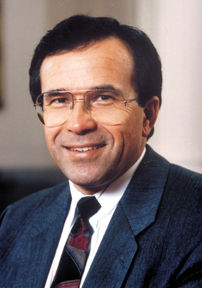Heather Dorothy Stefanson (née McDonald), Manitoba MLA 2000–present, premier of Manitoba 2021–23, Cabinet minister, attorney general, financial adviser (born 11 May 1970 in Winnipeg, MB). Heather Stefanson has been the Member of the Legislative Assembly (MLA) for the Winnipeg district of Tuxedo since 2000. After the Progressive Conservative (PC) Party won the 2016 election under leader Brian Pallister, Stefanson entered his Cabinet as minister of justice, attorney general and deputy premier. She was later minister of families and minister of health and seniors care. After Pallister resigned in 2021, Stefanson became PC leader and Manitoba's first female premier. She announced she would step down as leader after the party lost the general election in October 2023.

Early Life and Education
Heather McDonald was born in Winnipeg. Her father, Julian Hugh McDonald, had grown up in the west-end neighbourhood of Tuxedo. He ran for office in the Fort Rouge riding in 1977 but lost to Lloyd Axworthy. Growing up, Heather attended St. John’s-Ravenscourt School. After high school graduation, she moved to London, Ontario. She studied political science at the University of Western Ontario.
Early Career
After graduating, Heather McDonald moved to Ottawa. She worked as an assistant in the Prime Minister’s Office (PMO) during Brian Mulroney’s tenure. During this time, she met her future husband, Jason Stefanson. He was a Senate staffer before going on to work at CIBC World Markets Inc. in Winnipeg.
In 1993, Heather returned to Winnipeg. She worked as an assistant for the federal department of agriculture during the short-lived Kim Campbell administration. Following the electoral collapse of the federal PCs in October 1993, she entered the private sector. Throughout the 1990s, she worked as an investment adviser at Midland Walwyn and at Wellington West Capital. In 1999, she was suspended by her accrediting agency for lacking certain qualifications. She continued to advise clients despite her suspension and was fined $3,000 for the infraction in 2002.
Provincial Politics
In 1998, Heather Stefanson and her newly married husband, Jason, bought a house in Tuxedo. Her involvement in provincial politics began that year. She volunteered in the office of Gary Filmon, who was then premier of Manitoba and MLA for Tuxedo. But in 1999, Filmon lost the premiership to Gary Doer and the New Democratic Party (NDP). The following year, Filmon resigned his seat. In the subsequent by-election for the Tuxedo riding, Stefanson ran for the PCs and won.
The NDP maintained control of Manitoba’s Legislative Assembly for 16 years, first under Doer and later under Greg Selinger, who took over in 2009. Throughout the PCs’ time in opposition, Stefanson kept her seat in every election.

Cabinet Minister
In 2016, the PCs regained power under Brian Pallister. He appointed Heather Stefanson minister of justice and attorney general. In these roles, Stefanson focused on criminal justice reform. Two separate studies released that year — one internal and another by the Macdonald-Laurier Institute — ranked Manitoba’s justice system as the worst of all the provinces.
In 2018, Stefanson introduced a four-part plan to prevent crime by working with local police and mental health services; increasing out-of-court restorative justice practices for less serious offences; expediting trials for cases still in the courts; and preventing recidivism through improved probation oversight and community supports. The plan also mandated the ministry of justice to publish key performance indicators. Early results showed some success.
In 2018, a cabinet shuffle moved Stefanson to minister of families. In this role, she spearheaded legislation that streamlined licensing for child-care centres. It also introduced a $28-million plan to provide care for the children of essential workers during the COVID-19 pandemic. Amid the pandemic, Stefanson announced $31-million to repair and update the province’s stock of public housing. She also contributed to reforms in Manitoba’s family law designed to help separating couples find out-of-court resolutions.
In 2021, another cabinet shuffle installed Stefanson as the minister of health and seniors care. With the pandemic still ongoing, she focused on the vaccine rollout and Manitoba’s nursing shortage. She also expanded training spots and sped up the licensing of internationally educated nurses.
PC Leadership
Brian Pallister’s government declined in popularity during the COVID-19 pandemic. Manitoba had the second highest COVID-19 death rate after Quebec. In June 2021, support for the Manitoba PCs was at 29 per cent. On 1 September 2021, Pallister resigned as premier. He resigned as MLA on 4 October.
Heather Stefanson immediately announced her candidacy for PC leader, as did former Conservative Party MP Shelly Glover. When the Manitoba PCs voted on a new leader on 30 October 2021, Stefanson beat Glover by only 363 votes. The victory, however, was somewhat overshadowed by the fact that 1,200 party members had not received their mail-in ballots.
Premier
In office, Heather Stefanson unveiled her flagship policy package, the Path to Progressing Together. It pledged advances on many of her previous files, such as addressing the nursing shortage and improving access to mental health services. It also set commitments for improving co-operation with Indigenous leaders, decarbonizing the Manitoba economy, and boosting international investment.
Like her predecessor, Stefanson suffered very low public support. A March 2022 poll gave her only a 25 per cent approval rating.
Stefanson had received some criticism in May 2021 during her time as health minister. She had claimed that patients would not have to be transferred to intensive care units (ICUs) out of province — a claim she had to quickly reverse. Later that month, Krystal Mousseau, a 31-year-old mother of two from the Ebb and Flow First Nation, died while being prepped for transport to an ICU in Ontario. In March 2022, NDP leader Wab Kinew asked Stefanson in the legislature about the preventability of Mousseau’s death. Stefanson brushed it aside and used her speaking time to congratulate her son’s hockey team for winning a high school championship. She later apologized, but only after her conduct was widely denounced.

Another controversy arose around the criminal trial of Jeremy Skibicki, a white man accused of killing four Indigenous women. The remains of two of the women were believed to be in the Prairie Green landfill. The Assembly of Manitoba Chiefs (AMC) had called for them to be removed for a traditional burial. But Stefanson denied the request, citing concerns over safety and cost. Relations with Indigenous communities further deteriorated in August 2023. Stefanson declined an invitation to attend the AMC’s annual general meeting, while leaders of the opposition parties accepted.
Stefanson also came under fire for failing to properly disclose the sale of $31 million in property through the McDonald Grain Company, of which she was director and a shareholder, between 2016 and 2019. She was reprimanded on two occasions for campaigning outside of designated time periods. She failed to recuse herself from a committee that granted a $23 million contract to a firm that was a client of her husband at CIBC. She also presided over two labour disputes. During her tenure, workers at Manitoba Liquor and Lotteries as well as Manitoba Public Insurance went on strike.
In the election on 3 October 2023, Stefanson’s PCs were reduced from 35 seats to 22. Wab Kinew and the NDP won a majority government with 34 seats. Stefanson announced in her concession speech that she would be stepping down as PC leader. She continued to serve as MLA for Tuxedo, having narrowly defeated NDP candidate Larissa Ashdown by 263 votes.
(See also Premiers of Manitoba; Politics in Manitoba.)

 Share on Facebook
Share on Facebook Share on X
Share on X Share by Email
Share by Email Share on Google Classroom
Share on Google Classroom





